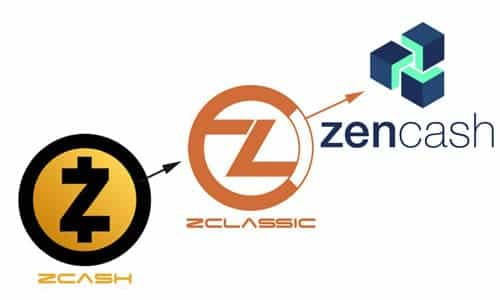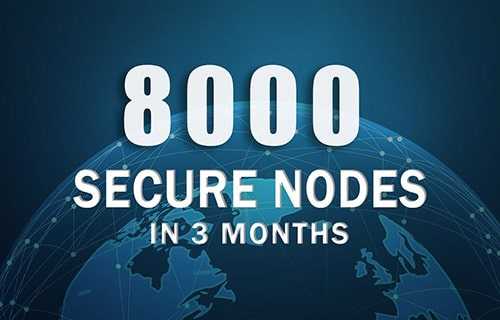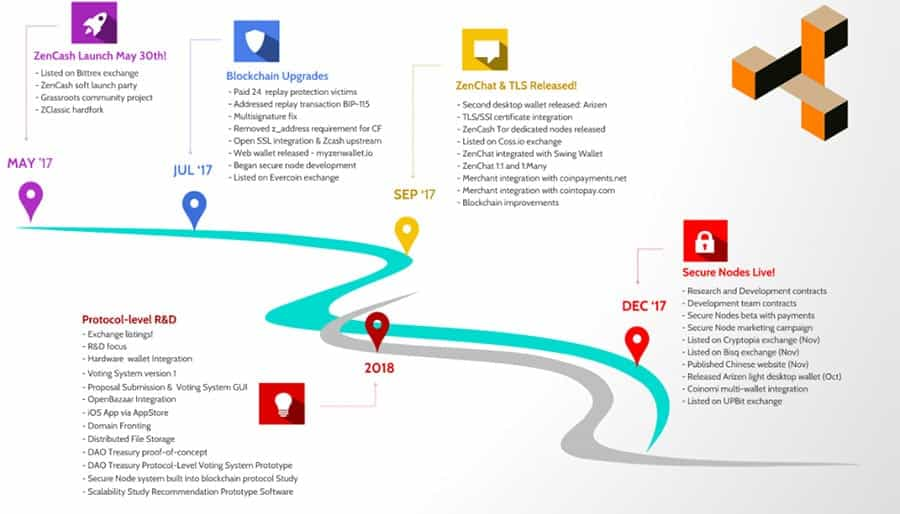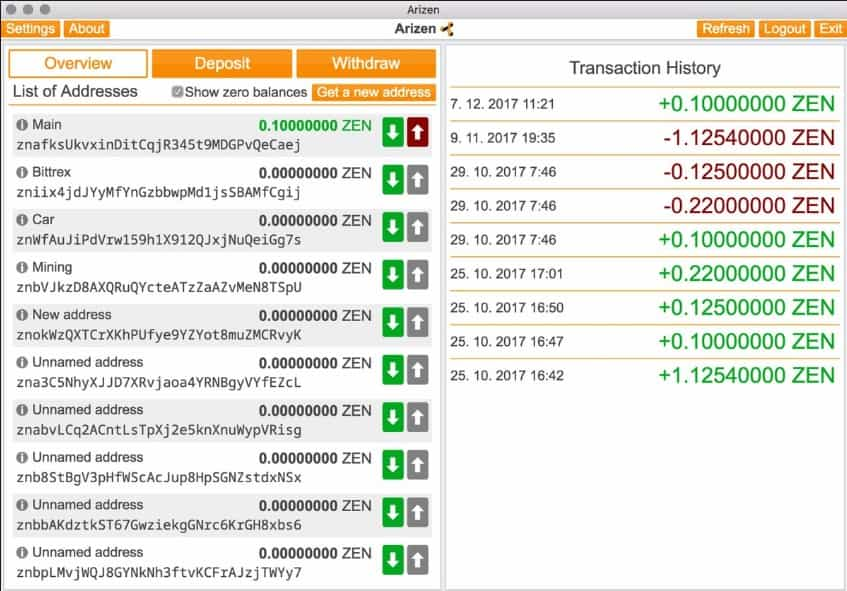ZenCash (ZEN) Review: The Complete Beginners Guide
ZenCash is a relatively new privacy coin that is garnering a great deal of attention lately.
It also comes at a time when a privacy concious cryptocurrencies are all the rage. We have seen a number of other coins being launched and forked in order to produce a more private cryptocurrency.
ZenCash is also an interesting coin to cover because of the similarities that it has with another established cryptocurrency, ZCash.
With that being said, there are a number of unique features with ZenCash that make it an interesting alternative private cryptocurrency. In this post we will take a look at the underlying technology of ZenCash as well as the team, roadmap and token potential.
Before we can do that though, we need to circle back to the underlying need for privacy coins.
Why Privacy Coins?
Many people are of the view that Bitcoin is a private currency. This is unfortunately not the case.
Given the nature of the Bitcoin blockchain, all transactions that take place on it can be traced and eventually linked to a person's name. This is also stored on the blockchain in an immutable fashion which means that it will be there forever.
Indeed, there are a number of companies that are now using advanced techniques and algorithms to keep track of what is happening on the blockchain. They have been used to track down a number of cyber criminals such as the Mt. Gox hack.
Even though the vast majority of people will not use cryptocurrencies for illicit purposes, it is disconcerting to know that the technology exists. Privacy is something that is in short supply today and cryptocurrencies have been designed to keep your finances private.
Hence, there has been a great demand for an alternative in the form of a private and untraceable cryptocurrency. Apart from the more established types such as Monero (XMR) and ZCash we have also seen newer variants such as Verge (XVG) and Bitcoin Private (BTCP).
Of course, a coin of great interest right now is ZenCash.
What is ZenCash?

ZenCash is much more than a mere decentralised cryptocurrency.
It is the first TLS encrypted cryptocurrency that incorporates a messaging network, content platform and domain fronting all into one.
ZenCash was launched as a fork of Zclassic on the 23rd of May, 2017. Zclassic is itself a fork of Zcash which therefore makes ZenCash a fork of a fork and hence has many of the same features as Zcash.
The fork from Zclassic happened on block 110,000 and was disbursed to ZClassic holders at a rate of 1 ZEN token for each ZCL token. This is termed an Airdrop in cryptocurrency parlance and is a great way for the developers to increase adoption and interest in the coin.
ZenCash Technology
Given that ZenCash is a descendent of Zcash, it will naturally share many of the same technological features. One of the most fundamental of this is the concept of Zk-snarks which is able to keep the transactions private.
ZK-snarks are based on the cryptographic discipline of Zero-Knowledge proofs. We have previously covered zero knowledge proofs in depth but they are based on the idea of proving existence of a key without revealing the key.
There are a number of features that exist on the ZenCash chain that are not present in the original chain. For example, the main feature of ZenCash is the end to end TLS encryption of the transactions. This makes them more secure.
Morover, there is no "founders tax" that is included in the protocol. This was one of the most contentious points that prompted the Zclassic fork.
The distribution of the Zen tokens that are mined will be broken down according to the following:
- Miners: 70%
- Treasury: 10%
- Secure Node Operators: 10%
- Super Node Operators: 10%
The secure node operators above are the ZenCash equivalent of masternodes. Masternodes are essentially participants in a network that will stake their tokens in order to take part in governance decisions as well as keeping the network honest.
However, secure nodes on the ZenCash network differ in a few ways and hence the slight change in name.
Overview of Secure Nodes

Unlike with Masternode staking, the secure nodes are not taken out of circulation and there is a lower coin requirement in order to operate a secure node.
The secure nodes will perform functions such as ensuring that all of the transactions are indeed secure and encrypted between the wallet and the nodes. They will do this by maintaining the full ZenCash blockchain. Secure nodes will also provide the certificate based encryption for the wallets.
Moreover, the secure node operators will try to keep the network appropriately decentralised and hence less susceptible to any form of DDOS attacks.
In order to operate a secure node, you will have to stake 42 ZEN. At current exchange rates that is only $1,500 which is considerably lower than the amount you would need to operate a Dash masternode for example (c. $443k).
Hence, the barrier to operate a secure node is much lower than with other cryptocurrencies and that means there is more scope for decentralisation.
Recently, Zencash has also just introduced the notion of the super nodes. These will require an investment of 500 ZEN and they will help manage the key network including the hosting of multiple services and sidechains. They will also track secure node uptime.
ZenCash Mining
The mining algorithm on ZenCash is Equihash. This is the same algorithm that is used in the mining of Zcash and Zclassic.
Mining takes place through a Proof-of-Work (POW) mining algorithm that will pay a block reward of 12.5 ZEN for each block mined. Much like other cryptocurrencies, the total supply of minable coins on ZenCash is fixed and limited to 21 million ZEN.
The blocktime on ZenCash is 2.5 minutes, which with current hashing power means that about 218,000 ZEN's are mined in one month. There is a total supply circulating of about 3.8 million coins.
In a similar fashion to Bitcoin, there will also be a halving in the mining reward that will occur every 4 years. If we take a look at mining profitability, ZenCash is currently sitting between ZCash and Zclassic in terms of overall returns.

Other Features of ZenCash
There are three other features that were included in the ZenCash network that makes it much more than a simple privacy conscious cryptocurrency. These include the chat, content publishing and the ability to circumvent bans on the crypto commerce.
These three features are called ZenChat, ZenPub and ZenHide.
ZenChat
This is the messaging service within the ZenCash protocol. It is encrypted using algorithms such as AES-256 which is understood to be one of the most secure in existence.
These messages are actually sent using the original design of the ZCash protocol where the transaction can be included with a message. These messages have to be limited to below 512 characters.
ZenPub
For those content producers who would like to publish content in an anonymous fashion, they can use ZenPub. This allows the producers to publish the content anonymously through the use of IPFS. This is posted through the text portion of the Z address.
ZenHide
This is probably one of the more interesting features of the ZenCash network. Did you know that countries that are hostile to Bitcoin or other cryptocurrencies can actually block them?
In order to circumvent this, ZenCash uses a technique called "Domain fronting". This will essentially hide the end point of the communication to obscure the connection. This is done by connecting via HTTPS to a CDN.
Future Developments
One of the initial ZenCash proposals was the notion of a broader governance structure that would allow for important development decisions be outsourced in a decentralised manner to the community.
The ZenCash team are looking to build into the protocol a Decentralised Autonomous Organisation (DAO). This was popularized with Etheruem back in 2016 before a devastating hack brought down the initial DAO that led to the formation of Ethereum Classic.
The ZenCash team wants to make their DAO governance structure much broader and open up a sort of competing landscape through numerous DAOs. In essence, each DAO will have a different team working on different aspects of the ZenCash network.

Apart from merely maintaining the integrity and security of ZenCash but the DAOs will help in governance decisions that apply to network changes. By using hardcoded governance structures such as the DAO, the chances of a network split in the future are limited.
You can read more about the DAO voting structure in the original ZenCash whitepaper.
Dedicated Core Team
The main team members behind ZenCash seem to be highly qualified for development of a secure cryptocurrency and network. ZenCash is lead by Joshua Yabut, Rob Viglione, and Rolf Versluis.
Joshua is an exploit developer by training who is has worked in aerospace engineering. Given his background in exploit discovery, his skills are well placed to develop a ZenCash network that is resistant to attacks by nefarious actors. He also has extensive experience from leading development in the core team at Zclassic.
Rob is also a previous member of the Zclassic team and has a similarly extensive cryptocurrency development experience. He has worked on the BitShares project as well as consulted for Bitgate.
Rolf is a Bitcoin and ZenCash miner who has extensive experience in the IT industry. He has worked at Cisco systems as well for the US Navy as a nuclear trained officer.
Apart from having such experience behind ZenCash, the team is also very active and collaborates on an ongoing basis with the community. You can head over to their slack channel to get a better sense of the ongoing discussions that are taking place.
Potential Concerns?
One of the concerns that some people may have with ZenCash is that a vulnerability in the underlying ZCash protocol could impact on ZenCash given that it is a sub-fork.
One of the most contentious aspects of Zcash from a privacy maximalist’s perspective is the trusted private key as well as the Zcash ceremony. Many have raised questions around the amount of trust a community can place into the hands of the original Zcash founders or the process they used to secure the key.
If, for any reason, the private key was compromised with Zcash then this would de-facto impact on ZenCash. However, this will not affect the protocol level communication and security measures that are currently in place.
Moreover, the ZenCash team has also considered moving to a new pararmeter generation ceremony. This would have to be based on broad community support. As mentioned by Rolf, the chief engineer:
we would move to a different underlying software system and would move to a different set of parameters at that time
This shows that the developers are open to the concerns of the general community.
ZenCash Tokens (ZEN)
The ZenCash tokens have been trading since June 2017 and the price has tracked the performance of most of the cryptocurrency market. If you wanted to buy some tokens then the best exchanges are either Bittrex of Cryptopia exchange.
Once you have bought your ZEN, there are a number of ways in which you can store it offline.
Perhaps the most secure way to store your ZEN is on a hardware wallet. ZenCash is now supported on the Ledger Nano S hardware wallet.
If you wanted to get the full functionality of the ZenCash network then you can download and use the developer recommended desktop wallets. This is the Arizen wallet and it is available on Windows, Linux and Mac.

The wallet is also available in a mobile version on android. The final alternative for storage is through the use of a paper wallet and cold storage. ZenCash has a paper wallet generation tool that will help you.
Conclusion
ZenCash is no doubt an interesting project. The underlying protocol involves some of the most advanced technologies such as Zk-snarks that are able to facilitate private transactions.
Moreover, ZenCash avoids many of the concerns that people may have with the founder’s tax that is part of the Zcash protocol. There are also a number of other interesting features of ZenCash that make it an exciting project.
From secure messaging to content publishing and decentralised governance, ZenCash wants to build an entire private ecosystem. While there may be some concerns with the secure private key, this is something that the development team is open to discuss with the community.
While we encourage readers to do their own research, ZenCash seems like an interesting project to watch in the ever expanding privacy coin market.
Disclaimer: These are the writer’s opinions and should not be considered investment advice. Readers should do their own research.
